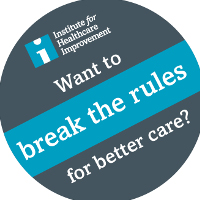
“Doctors of conscience have to resist the industrialization of their profession,” said Dr. Bernard Lown in a recent NY Times article on ‘Doctors, Revolt!’ Lown, 96, was hospitalized for pneumonia and questioning why nurses woke him up every few hours to take vitals when studies show that practice does little to change outcomes. Lown also happens to be emeritus professor of cardiology at Harvard, senior physician at Brigham & Women’s Hospital in Boston and founder of the Lown Cardiovascular Group.
What Lown is alluding to in the Times article is that there are rules and practices health care professionals are doing right now that have little or no effect on client outcomes– much of what consumes our day is busy work that organizations have been doing for years without clear reasoning for why other than that it’s how it’s been done for years. It also points to a system-wide change that is needed to shift the mindset from focusing on a person’s diagnosis to what’s important to them as a person.
The Institute for Healthcare Improvement (IHI) launched their campaign ‘Breaking the Rules for Better Care’ this week to address this very issue. Lifespark joined IHI and 243 organizations across 19 countries to collectively identify the ‘rules’ getting in the way of creating optimal care experiences for clients, providers, and staff.
Why? “Because we love the question and subsequent conversations this campaign is starting,” said Joel Theisen, RN, CEO/Founder of Lifespark. “We should all be questioning our practices as often as we can to make sure rules with unintended consequences aren’t getting in the way of providing the experience people want. The things that ‘spark’ people’s lives often have nothing to do with medical treatment, and yet it’s the medical red tape that gets in the way of creating powerful, positive experiences for people.” Joel agrees with IHI efforts that while rules are often created with good intention, it’s time we view our current system with a new lens. “Let’s work to create solutions that work for people and those who serve them, rather than against them,” said Joel.
What are the rules that hinder the delivery of care? We posed IHI’s  question to our own leadership team to learn what rules they feel hinder the client experience. What we learned provided some great internal dialogue about ways we as a company can change but also ways the health care system as a whole needs to change.
question to our own leadership team to learn what rules they feel hinder the client experience. What we learned provided some great internal dialogue about ways we as a company can change but also ways the health care system as a whole needs to change.
‘If you could break or change one rule in service of a better care experience for clients or staff, what would it be?’:
- “Eliminate fee-based services, force long-term accountability for person-centered care…. Not provider- or payor-centric and create a model that increases accountability for personal health and rewards individuals who live healthy lives that lower overall costs with monetary sharing.”
– Joel Theisen, RN, CEO/Founder - “Reduce the regulations and administrative burden for providers as payors. For example, the barrier to entry in Medicare Advantage is steep. Accountable Care Organizations (ACO) use an ‘attribution’ model based on the client’s primary care provider, yet who is in the client’s home working with them where they live, play, and work? It’s usually community-based providers who provide care and service to individuals 365 days a yearSo who should really ‘own’ the ongoing client relationship within the ACO?”
– Matt Kinne, VP, Population Health - “Stop referring to us as ‘patients.’ We are customers with choices and purchasing power and should be referred to accordingly.” – Carol Stanley, VP, Knowledge Management
- “Do away with doctor’s orders for all home health services and give more power to the clinician actually seeing and working with the client.” – Ali McNulty, DPT, Director, Navigation
- “Break the rules for how people fund care. You either have too much money to qualify for waiver or medical assistance but not enough to pay for private-pay. There has to be a better way. I would love to break the Medicare rules to qualify for home care – make it proactive versus reactive care.” – Kris Teigen, RN, Director, Business Development
- “The single biggest thing we can do is to adopt a true standard of data sharing and revamp some of the real and perceived issues with HIPAA regulations and its impact on data sharing. On the technical front, standards for data sharing have been based on extremely old archaic ways of transferring data through flat messages transfers. On the regulation front, HIPAA itself has been a large hinderance. While HIPAA has a noble goal to protect the privacy of consumers in health care, the regulations have been confusing and guidance has been muddy.”
– John Fraser, CTO - “Examine our own individual practices. What unwritten rules and behaviors are affecting the experience we create for our clients? I often hear providers use the words ‘non-compliant’ to describe someone. Is that person really non-compliant? By whose perspective? Perhaps we as the providers are just not ‘seeing’ that person’s goals. I also hear people say ‘I can’t do that. I’m not allowed to take those steps.’ We need to challenge these statements to see what’s really not allowed. Those questions and challenges will be the key to eliminating outdated rules and truly changing the experience.”
– Karen Carney, VP, Marketing & Communications
Breaking the rules is a great starting point to begin some of these conversations. Are those vital signs needed every few hours if they hinder a person’s recovery? Do we need to follow certain protocols just because we’ve been doing them for years? Are we focusing on the right things when it comes to care – the person not the rules?
We’d love to have you join our conversation – what rules would you break? And how will you break them? Share On!


